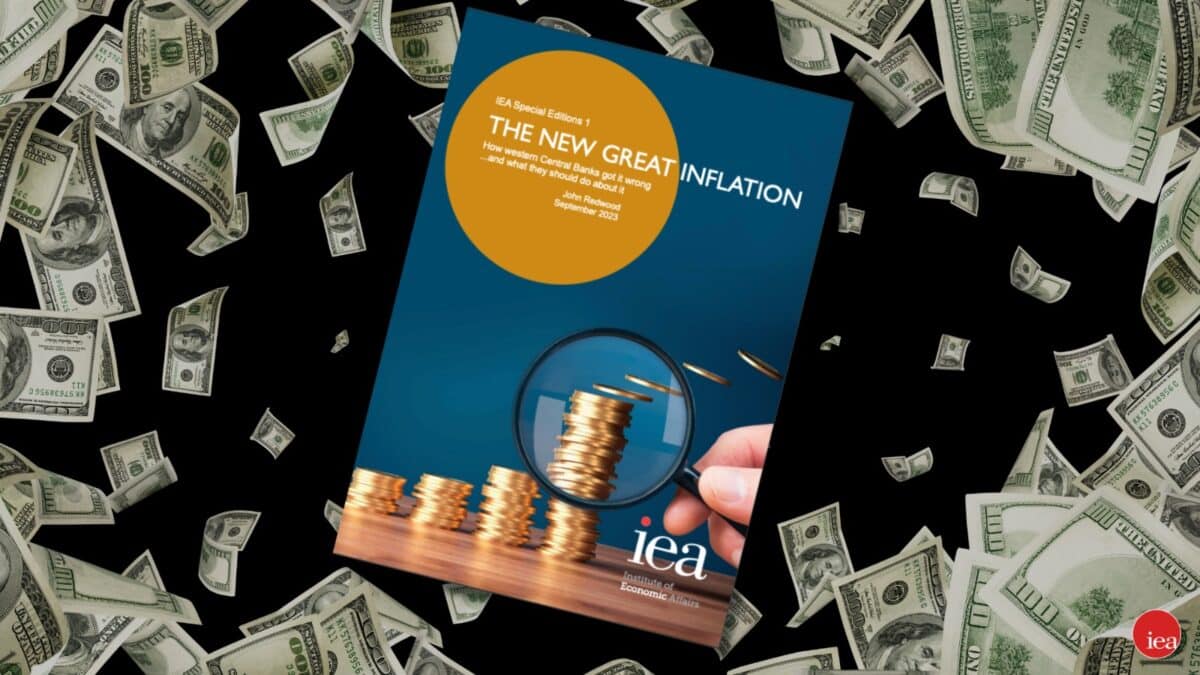Bank of England could cost taxpayers £100 billion in losses on QE, says Rt Hon Sir John Redwood MP
SUGGESTED


IEA research featured in The Times

- The Bank of England allowed inflation to get out of control before the invasion of Ukraine and the associated disruption of energy and food markets
- Western central bankers’ quantitative easing, printing money to purchase bonds, and near-zero interest rates helped fuel inflation
- Japan and China avoided spiralling inflation, while central bankers in the UK, US and Eurozone failed to forecast the impact of expanding the money supply
- The Bank of England is now overcompensating by rapidly selling bonds, costing taxpayers billions
The Bank of England has already cost taxpayers £24 billion to cover losses from selling bonds to April 2023, a figure that could rise to as much as £100 billion.
A new paper authored by Sir John Redwood MP, published by the free market think tank the Institute of Economic Affairs, says the Bank should cease selling bonds and allow maturities to gradually reduce the balance sheet.
During the Covid-19 pandemic, the Bank created an extra £450 billion as part of quantitative easing, buying up bonds using newly created money. This resulted in too much money chasing too few goods and subsequent inflation.
But now, Redwood argues, the Bank is overcorrecting for the earlier failure by keeping interest rates too high for too long driving up mortgage rates, and undertaking quantitative tightening (QT), selling the bonds purchased during QE.
The United Kingdom has faced a cost of living crisis following the Covid-19 pandemic, yet the likes of China and Japan avoided the scourge of inflation. Redwood blames this on the failures of central bankers.
In July 2021, Bank of England Governor Andrew Bailey labelled resurgent inflation “temporary”. However, it peaked at over 11 per cent in October 2022 and has remained persistently above the official 2 per cent target. According to Redwood this inflation cannot be blamed on the Ukraine war, and spiralling energy and food prices. Inflation was already well above target and rising before the invasion.
Redwood contrasts this with Japan and China, who undertook no additional QE during Covid-19 and where inflation peaked at just 2 per cent and 3.2 per cent, respectively. These countries faced similar external pressures without the same cost of living crisis.
Redwood blames failures at the Bank of England – along with US Federal Reserve Bank and the European Central Bank – on faulty forecasting models that placed too little weight on the growth of the money supply. This resulted in central bankers missing the inflation threat.
The paper also highlights the important role of the UK government in approving QE, with the Treasury providing a guarantee for any losses from buying and selling the bonds. “The central banks are clearly not independent when it comes to setting policy objectives,” Redwood writes. “They respond to informal and formal changes to their remit from governments.”
Redwood calls for the Bank of England to review its models to improve inflation forecasting, investigate the role of money and credit growth in inflation, and prioritise diversity of economic thought among senior staff and external appointees.
He also calls for the government to link Bank of England senior staff and Monetary Policy Committee members’ pay to their ability to forecast and control inflation, manage public finances with controlling inflation in mind, and move away from the current ‘high tax, high subsidy model’.
Sir John Redwood, MP for Wokingham and report author, said:
“The leading Central banks need to improve their forecasts of inflation as a basis for better policy responses. They should not go too far the other way and create a recession. Printing too much money and buying too many bonds on the way up, and now selling too many bonds and making huge losses on the way down create a boom/bust cycle. Taking money and credit seriously might help them get a grip on inflation”
ENDS
Notes to Editors
Contact: media@iea.org.uk / 07763 365520
Read a copy of The new great inflation: how Western central banks got it wrong and what to do about it, by Sir John Redwood MP.
In July 2021, the IEA’s Shadow Monetary Policy Committee were among the first groups to identify the risk of inflation and call for an interest rate rise. But, in their latest meeting released in August 2023, the SMPC said a further interest rate rise would risk damaging the UK’s fragile economy and is unnecessary to tackle inflation.
IEA Economics Fellow Julian Jessop has warned throughout the period of inflation that the Bank of England focuses too little on the money supply and too much on backwards-looking data.
About the Author
Sir John Redwood is the author of the daily commentary site www. johnredwood.com. A Distinguished Fellow of All Souls College, Oxford he has been a Cabinet Minister and Shadow Cabinet Minister, the chairman of a public listed industrial group, the co-founder of an investment management business and written many newspaper articles. He has published widely on economics and politics including ‘Popular Capitalism’, a book on wider ownership, ‘We Don’t Believe You’, a book on populist movements, and ‘Our Currency, Our Country’, on keeping the pound. He is the Conservative MP for Wokingham.
The mission of the Institute of Economic Affairs is to improve understanding of the fundamental institutions of a free society by analysing and expounding the role of markets in solving economic and social problems. The IEA is a registered educational charity and independent of all political parties.



